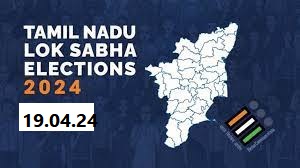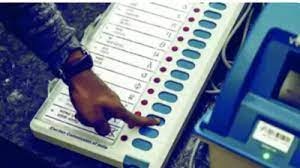Schedule for General Elections to Lok Sabha Election 2024 Tamil Nadu : elections.tn.gov.in
Organisation : Election Commission of India Public (Elections) Department, Tamil Nadu
Announcement : Schedule for General Elections to Lok Sabha Election 2024
Applicable State/UT : Tamil Nadu
Website : https://www.elections.tn.gov.in/GELS_2024.aspx
Contents
Schedule for General Elections to Lok Sabha Election
Date of Issue of Gazette Notification 20.03.2024 (Wednesday)
Last Date of Nominations 27.03.2024 (Wednesday)
Date for Scrutiny of Nominations 28.03.2024 (Thursday)
Last Date for withdrawal of candidatures 30.03.2024 (Saturday)
Date of Poll 19.04.2024 (Friday)
Date of Counting 04.06.2024 (Tuesday)
Date before which election shall be completed 06.06.2024 (Thursday)

What is Model Code of Conduct?
The Model Code of Conduct for guidance of political parties and candidates is a set of norms which has been evolved with the consensus of political parties who have consented to abide by the principles embodied in the said code and also binds them to respect and observe it in its letter and spirit.
What is the role of Election Commission in the matter?
The Election Commission ensures its observance by political party(ies) in power, including ruling parties at the Centre and in the States and contesting candidates in the discharge of its constitutional duties for conducting the free, fair and peaceful elections to the Parliament and the State Legislatures under Article 324 of the Constitution of India. It is also ensured that official machinery for the electoral purposes is not misused. Further, it is also ensured that electoral offences, malpractices and corrupt practices such as impersonation, bribing and inducement of voters, threat and intimidation to the voters are prevented by all means. In case of violation, appropriate measures are taken.
From which date the Model Code of Conduct is enforced and operational upto which date?
The Model Code of Conduct is enforced from the date of announcement of election schedule by the Election Commission and is operational till the process of elections are completed.
What is applicability of code during general elections and bye-elections?
a. During general elections to House of People (Lok Sabha), the code is applicable throughout the country.
b. During general elections to the Legislative Assembly (Vidhan Sabha), the code is applicable in the entire State.
c. During bye-elections, in case the constituency is comprised in State Capital/Metropolitan Cities/Municipal Corporations, then the code would be applicable in the area of concerned Constituency only. In all other cases the MCC would be enforced in the entire district(s) covering the Constituency going for bye-election(s).
What are the salient features of the Model Code of Conduct?
The salient features of the Model Code of Conduct lay down how political parties, contesting candidates and party(s) in power should conduct themselves during the process of elections i.e. on their general conduct during electioneering, holding meetings and processions, poll day activities and functioning of the party in power etc.

Instructions of Political Parties & Candidates
DOs & DON’Ts for Electioneering to be Followed by Political Parties and Candidates
1 The Election Commission has drawn up a list of ‘Dos’ and ‘Don’ts’ to be followed by political parties and contesting candidates after the announcement of elections and till the completion of the process of elections. The Election Commission has directed that this be given the widest possible publicity in the official language of the State and its contents brought to the knowledge of all candidates and political parties.
2 It must be made clear to the political parties that the list of Dos’ and Dont’s is only illustrative (not exhaustive) and is not intended to substitute or modify other detailed directions/instructions on the concerned subjects, and must be strictly observed and followed.
(A) DOs :
(i) To ensure a level playing field, public places like maidans and helipads must be available impartially to all parties/contesting candidates.
(ii) During elections, criticism of other political parties and candidates should be restricted only to their policies, programs, past records and works.
(iii) The right of every individual for peaceful and undisturbed home life should be fully safeguarded.
(iv) The local police authorities should be fully informed and necessary permission be taken well in time, of the venue and time of the proposed meetings.
(v) Restrictive or prohibitory orders in force, if any, in the place of the proposed meeting, shall be fully respected. Exemption, if necessary, must be applied for and obtained, well in time.
(vi) Permission must be obtained for use of loudspeakers or any other such facilities for the proposed meetings.
(vii) Police assistance should be obtained in dealing with persons disturbing meetings or creating disorder.
(viii) The time and place of the starting and termination of any procession and the route to be followed should be finalized in advance and prior permissions obtained from the police authorities.
(ix) Traffic regulations and restrictive orders, in force of the localities, enroute of the procession should be ascertained and fully complied 28“No voter to be left behind” with.
(x) The passage of the procession must be without hindrance to traffic.
(xi) Cooperation should be extended to all election officials to ensure peaceful and orderly poll.
(xii) All political workers engaged in electioneering must display badges or identity cards.
(xiii) Unofficial identity slips issued to voters shall be on the plain
(white) paper and not contain any symbol and name of the party or name of the candidate.
(xiv) Restrictions on plying of vehicles during the campaign period and on poll day shall be fully obeyed.
(xv) Any complaint or problem regarding the conduct of elections shall be brought to the notice of the Election Commission’s Observer/ Returning Officer/Zonal/Sector Magistrate/Chief Electoral Officer/Election Commission of India.
(xvi) Directions/orders/instructions of the Election Commission/ Returning Officer/District Election Officer, in all matters related to various aspects of elections, shall be strictly complied with. (xvii) Do leave the constituency after the campaign period is over if you are not a voter or a candidate or candidate’s election agent from that constituency.
(xviii) The political parties should ensure that no payment in excess of Rs. 10,000 is made in cash, in a day, to any person/company/ entity, except where
(a) the payment is made in a village or town, which is not served by a bank;
(b) the payment is made to any employee or party functionary towards salary, pension or for reimbursement of his expenses;
(c) cash payment is required under any statute.
(B) DON’Ts :
(i) No official work should be mixed with campaigning/electioneering. No inducement, financial or otherwise, shall be offered to the voter.
(ii) No appeal on basis of caste/communal feelings of the electors.
(iii) No activity, which may aggravate existing differences or create mutual hatred or cause tension between different castes/ communities/ religious/linguistic groups, shall be attempted.
(iv) No aspect of the private life, not connected with the public activities, of the leaders or workers of other parties shall be criticized.
(v) No criticism of other parties or their workers on basis of unverified allegations or on distortions.
(vi) No use of temples/mosques/churches/gurudwaras or any place of worship for election propaganda, including speeches, posters, music etc., or electioneering.
(vii) Activities, which are corrupt practices or electoral offences such as bribery, undue influence, intimidation of voters, personation, canvassing within 100 meters of a polling station, holding of public meetings during the period of 48 hours ending with the hour fixed for the close of the poll and conveyance of voters to and from polling stations, are prohibited.
(viii) Demonstrations or picketing before house of any individual, by way of protesting against their opinion or activities shall not be resorted to.
(ix) In order to maintain purity of elections and bring transparency in process of elections, political parties are advised to avoid transactions in cash and instruct their office bearers, official, agents and candidates not to carry huge amount of cash during elections.
(x) No disturbances shall be created in public meetings or processions organized by other political parties or candidates.
(xi) No processions along places where another party is holding meetings.
(xii) Processionists shall not carry any articles, which are capable of being misused as missiles or weapons.
(xiii) Posters issued by other parties and candidates shall not be removed or defaced.
(xiv) Posters, flags, symbols or any other propaganda material shall not be displayed in the place being used on the day of poll for distribution of identity slips or near polling booths.
(xv) No use of loudspeakers whether static or mounted on moving vehicles, between 10.00 p.m. and 6.00 a.m.
(xvi) No use of loudspeakers at public meetings and processions without prior written permission of the authorities concerned. Normally, such meetings/processions will not be allowed to continue beyond 10.00 p.m. in the night and will be further subject to the local laws, local perceptions of the security arrangements of the area and other relevant considerations like weather conditions, festival season, examination period, etc.
(xvii) No liquor should be distributed during elections.